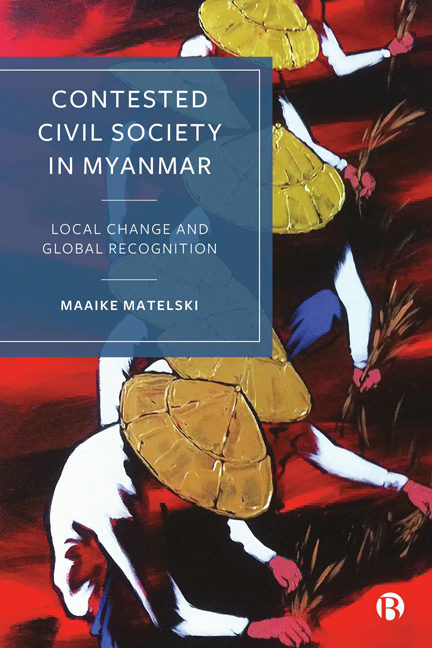Book contents
- Frontmatter
- Contents
- List of Abbreviations and Acronyms
- Acknowledgements
- Introduction: Contested Representation in Burma/Myanmar
- 1 Conflict, Repression and Resistance from Colonialism to Military Rule
- 2 Constructing Civil Society in Myanmar
- 3 Diversity and Fault Lines in Burmese Civil Society
- 4 Room to Manoeuvre under Authoritarian Rule
- 5 Transnational Advocacy Strategies and Pathways to Change
- 6 Competing Frames around the 2010 Elections
- 7 Foreign Aid and the (De)politicization of Civil Society Assistance
- 8 Interrupted Transition and Post-coup Resistance
- Conclusion
- Notes
- References
- Index
7 - Foreign Aid and the (De)politicization of Civil Society Assistance
Published online by Cambridge University Press: 28 March 2024
- Frontmatter
- Contents
- List of Abbreviations and Acronyms
- Acknowledgements
- Introduction: Contested Representation in Burma/Myanmar
- 1 Conflict, Repression and Resistance from Colonialism to Military Rule
- 2 Constructing Civil Society in Myanmar
- 3 Diversity and Fault Lines in Burmese Civil Society
- 4 Room to Manoeuvre under Authoritarian Rule
- 5 Transnational Advocacy Strategies and Pathways to Change
- 6 Competing Frames around the 2010 Elections
- 7 Foreign Aid and the (De)politicization of Civil Society Assistance
- 8 Interrupted Transition and Post-coup Resistance
- Conclusion
- Notes
- References
- Index
Summary
Our main challenge is funding. Because without money we cannot work. Normally we cannot get money from the community, because people are still poor.
For all the political sensitivities and organizational rivalries discussed earlier, civil society’s room to manoeuvre in Myanmar, as in any country, is conditional on having the funds available to carry out activities. This chapter describes both the opportunities provided and the challenges posed by foreign donor assistance to civil society. Although civil society actors in Myanmar have become skilled at organizing activities with relatively low budgets, many organizations, especially those without a clear religious affiliation, suffered from the pervasive poverty levels in the country and turned to outside funders for assistance. This partial dependence on foreign donors and the sudden rise in donor funding during the political transition period posed a number of challenges not unlike those described in development literature on other recipient countries. Senders of aid have been accused of prioritizing their own political, economic and geo-strategic interests over the interests of beneficiaries, of distributing aid insufficiently and inconsistently, and of paying lip service to values such as development and democracy while actually pursuing economic agendas. At the same time, donors have sometimes provided vital financial and moral support in environments where the country’s own government and local actors are incapable or unwilling to do so. The pervasive role of the military in Myanmar posed a number of unique challenges to donors and recipient organizations alike, resulting in particularly vehement debates around the politicization of aid.
Although funding for civil society can come from a number of sources, government assistance and private donations from inside the country are often ruled out in contexts of pervasive poverty levels and repressed civic space. As wealth in those contexts is often acquired in close collaboration with political and business elites, the more affluent sections of society tend to be reluctant to support activities that might challenge the status quo (Parks, 2008). Moreover, in authoritarian countries many organizations try to stay under the radar, which complicates their ability to fundraise (Cleary, 1997; Wells-Dang, 2012). This has certainly been the case in Myanmar; as a respondent commented in 2015: “I think we should also do fundraising inside the country. But those who have the money are the cronies.”
- Type
- Chapter
- Information
- Contested Civil Society in MyanmarLocal Change and Global Recognition, pp. 117 - 135Publisher: Bristol University PressPrint publication year: 2023



